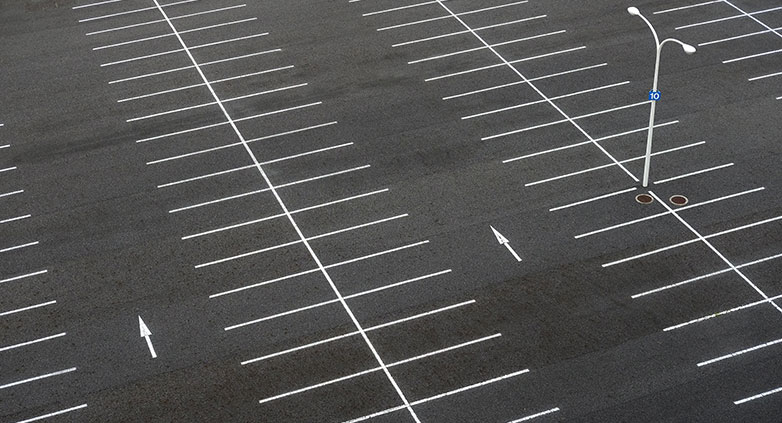Parking Lot Surface Options – Unveiling 5 Premier Solutions
Choosing the right parking lot surface is crucial for any business. From asphalt to pavers, each option offers unique benefits. Let’s explore these to find your perfect fit.
The top five parking lot surface options include asphalt, known for its durability and cost-effectiveness; concrete, offering longevity and strength; gravel, a budget-friendly choice; tar-and-chip, providing a rustic look; and pavers, for a customizable, aesthetic appeal. Each material has its pros and cons, tailored to different needs and budgets.
Dive deeper into each option’s advantages and limitations. Understanding these details helps you make an informed decision that aligns with your business’s specific requirements.
#1: Asphalt Parking Lots
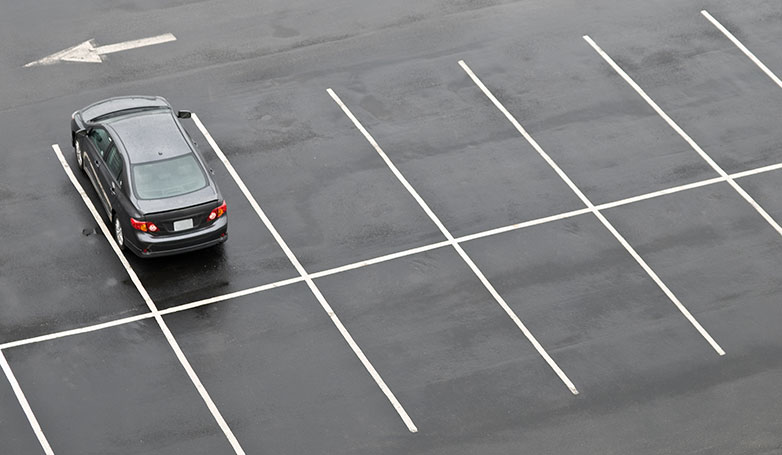
Asphalt, a composite material predominantly made from aggregates like stone and sand, mixed with a binder (usually bitumen), is a go-to choice for many when it comes to paving parking lots. This combination creates a durable and flexible surface that can withstand various weather conditions and heavy traffic.
The Aesthetic and Functional Appeal
Asphalt parking lots offer a sleek, uniform look that contributes to the overall aesthetic appeal of a business environment. The dark color of asphalt provides a strong visual contrast, making parking lines and signage stand out, which is essential for safety and ease of navigation. Its smooth surface also enhances driving comfort and reduces the noise associated with vehicular traffic.
Adaptability to Weather Conditions
One of the key characteristics of asphalt is its adaptability to different weather conditions. In colder climates, asphalt’s black color absorbs heat from the sun, aiding in the melting of snow and ice, which can be a significant advantage. Additionally, its flexible nature allows it to expand and contract with temperature changes, reducing the likelihood of cracking.
Environmentally Friendly Options
Asphalt is also recognized for its environmental benefits. It is 100% recyclable, and modern techniques allow for old asphalt to be removed and reused, reducing the need for new materials and minimizing waste. Furthermore, innovations in asphalt production have led to the development of porous or permeable asphalt, which helps in managing stormwater runoff, a significant environmental consideration.
Maintenance and Upkeep
While asphalt is known for its durability, like any surface designated for vehicles, it demands consistent maintenance. Routine care, including seal coating, crack filling, and pothole repair, becomes essential to prolong the lifespan of an asphalt parking area. When properly maintained, this surface can endure for numerous years, ensuring a dependable and functional space for businesses.
Asphalt Parking Lot Pros And Cons
When considering a parking lot for your business, it’s crucial to weigh the pros and cons of different surface materials. Asphalt, a popular choice, offers a unique set of advantages and drawbacks. Here’s a detailed comparison to help you understand whether asphalt is the right fit for your parking needs:
| Pros | Cons |
|---|---|
| Durability: Asphalt surfaces last 25-30 years with proper maintenance. | Regular Maintenance: Requires cleaning at least twice a year and seal-coating every 2-5 years. |
| Immediate Usability: Asphalt parking lots can be used almost immediately after installation. | Limited Aesthetics: Asphalt might not align with specific aesthetic preferences. |
| Cost-Effective: Costs range from $2.50 to $4.50 per square foot. |
#2: Concrete Parking Lots
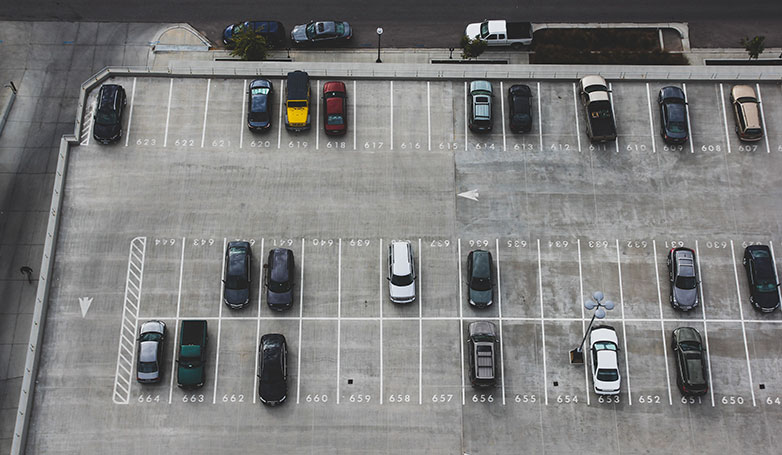
Concrete, a highly durable and robust material, is composed of cement, water, and aggregates like gravel and sand. It’s a preferred choice for many commercial and industrial parking lots due to its strength and longevity. Concrete surfaces can withstand heavy loads and high traffic without significant wear and tear, making them an ideal choice for areas with high vehicular usage.
Cost Considerations
Concrete parking lots are generally more expensive than other surface options like asphalt. This higher cost is due to the material’s strength and durability, as well as the labor-intensive installation process. While the initial investment is higher, the long-term benefits often justify the expense, as concrete lots require fewer repairs and have a longer lifespan.
Installation Process
The installation of a concrete parking lot is more time-consuming compared to asphalt. It requires careful preparation of the base, precise mixing of the concrete, and adequate time for curing. This extended installation period can lead to longer downtimes for businesses, but the result is a highly durable and stable surface.
Longevity and Maintenance
One of the significant advantages of concrete is its extreme durability. A well-installed and properly maintained concrete parking lot can last for several decades, often outlasting asphalt surfaces. Maintenance requirements are minimal, typically involving basic cleaning and occasional sealing to prevent stains and enhance durability.
Customization and Aesthetic Appeal
Concrete offers diverse customization options, which is a significant advantage for businesses looking to achieve a specific aesthetic. It can be colored, stamped, or textured to create various designs, from a simple, elegant look to more intricate patterns that complement the architectural style of the surrounding buildings. This versatility allows business owners to tailor their parking lots to fit their branding and aesthetic goals, creating a visually appealing first impression for customers and visitors.
Concrete Parking Lot Pros And Cons
When deciding on a surface material for your parking lot, it’s important to consider both the advantages and disadvantages of each option. Concrete is a popular choice due to its durability and low maintenance requirements, but it also comes with certain drawbacks such as cost and installation time. Here’s a summary of the pros and cons to help you evaluate if a concrete parking lot is suitable for your needs:
| Pros | Cons |
|---|---|
| Durability: Concrete surfaces are extremely durable and can last up to 30 years. | Cost: Concrete lots are more expensive, costing between $4.00 and $7.00 per square foot. |
| Little Maintenance: Requires minimal upkeep. | Delayed Usability: Concrete parking lots need about one week to set,. |
| More Finish Options: Offers a range of customizable finishes. |
#3: Gravel Parking Lots
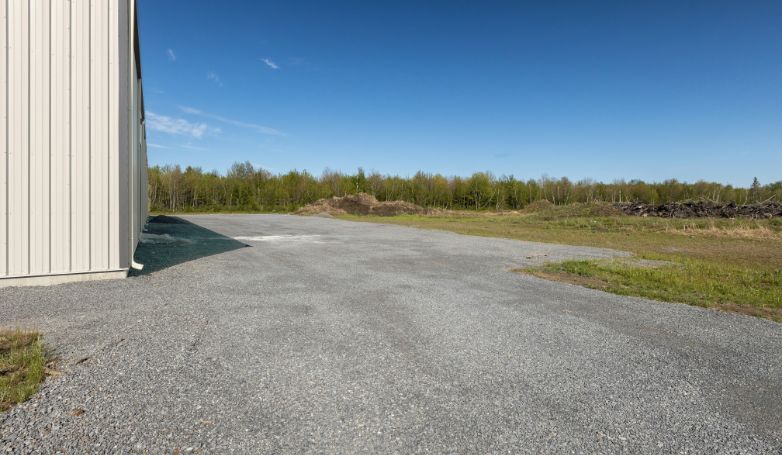
Gravel stands out as one of the most cost-effective options for parking lot surfaces. It is significantly less expensive than other materials like asphalt and concrete, making it an attractive choice for businesses with limited budgets or for temporary parking solutions. The lower cost also makes gravel an ideal option for larger areas where the expense of other materials might be prohibitive.
Immediate Usability
One of the appealing aspects of gravel parking lots is their immediate usability post-construction. Unlike asphalt or concrete that require curing or setting time, gravel lots can be used as soon as they are laid and compacted. This immediate functionality is particularly beneficial for businesses that cannot afford downtime.
Durability Concerns
While gravel is an economical choice, it is less durable compared to more solid surfaces like asphalt and concrete. Gravel can shift and disperse under regular use, especially in areas with high traffic or heavy vehicles. This can lead to uneven surfaces and the need for frequent leveling and replenishment.
Maintenance Requirements
Gravel lots are maintenance-heavy. They require regular attention to maintain a level surface and to manage issues like potholes, ruts, and erosion. Additionally, gravel can be displaced by vehicles or washed away by rain, necessitating periodic topping up. Regular maintenance is crucial to ensure a safe and navigable parking area.
Aesthetic Considerations
In terms of aesthetics, gravel lots generally do not offer the same visual appeal as paved surfaces. They can appear less formal or polished, which might not align with the desired image of some businesses. However, for rural settings or businesses aiming for a more natural or rustic look, gravel can be an appropriate and harmonious choice.
Gravel Parking Lot Pros And Cons
When selecting a material for your parking lot, understanding the strengths and weaknesses of each option is crucial. Gravel, while being an affordable and immediately usable choice, also presents challenges in terms of durability, maintenance, and aesthetics. Here’s a concise overview of the pros and cons of gravel parking lots to guide you in making an informed decision:
| Pros | Cons |
|---|---|
| Cost: Gravel is one of the least expensive options, costing $1.25 to $2.00 per square foot. | Durability: Gravel lots often lasting less than 7 years without extensive maintenance. |
| Immediately Usable: Gravel lots can be used right after installation. | Frequent Maintenance: Gravel lots require regular maintenance. |
| Poor Aesthetics: Gravel lots often appear less formal and can create dust and dirt issues. |
#4: Tar And Chip Parking Surfaces
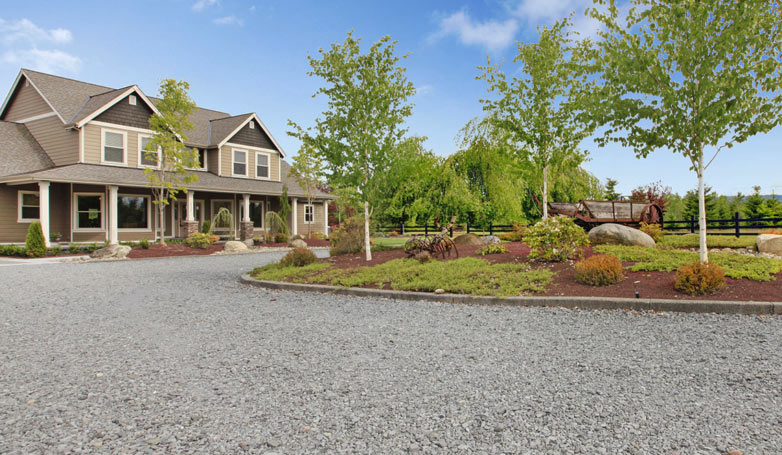
Tar and chip, also known as chip-and-seal or seal chip, offers a cost-effective alternative to more traditional parking lot surfaces like asphalt or concrete. It’s particularly favored for its lower installation costs, making it a viable option for businesses looking to minimize initial expenditures on their parking areas. The affordability of tar and chip surfaces makes them an attractive choice for larger areas where cost is a significant factor.
Durability and Lifespan
While tar and chip surfaces are less expensive, they typically do not have the same longevity as asphalt or concrete. These surfaces are more prone to wear and tear over time, especially in high-traffic areas. However, with proper installation and moderate usage, a tar and chip parking lot can still provide a reliable surface for a considerable number of years.
Customization Options
A notable advantage of tar and chip surfaces is the ability to customize them in various colors. This customization is achieved by using different types of stones for the ‘chip’ part of the installation. This flexibility allows businesses to match the parking lot’s appearance with the building’s aesthetics or corporate branding, offering a unique and customized look.
Maintenance Requirements
Tar and chip surfaces require relatively low maintenance compared to asphalt or concrete. However, they do need specific care to maintain their appearance and functionality. While they do not typically require regular sealing like asphalt, they may need occasional attention to address any loose stones or wear patterns that develop over time.
Immediate Usability
Another significant advantage of tar and chip surfaces is their quick usability after installation. Similar to gravel, these surfaces can be used almost immediately after they are laid, reducing downtime for businesses. This feature is particularly beneficial for operations that cannot afford to close their parking areas for extended periods.
Tar And Chip Parking Lot Pros And Cons
When exploring some parking lot surface options, tar and chip provides a unique set of characteristics to consider. It’s a cost-effective solution with certain aesthetic and maintenance advantages, but it also comes with considerations regarding durability and initial wait time for use. Here’s a detailed breakdown of the pros and cons of tar and chip parking lots to aid you in your decision-making process:
| Pros | Cons |
|---|---|
| Cost: Tar and chip is a budget-friendly option, costing only $1.00 to $3.00 per square foot. | Durability: lasting 7-10 years. |
| Easy Maintenance: Little maintenance needed. | Short Wait Time Required: A setting period of 24 hours is needed. |
| Aesthetics: Offers versatility with different stone colors, |
#5: Parking Lot Pavers
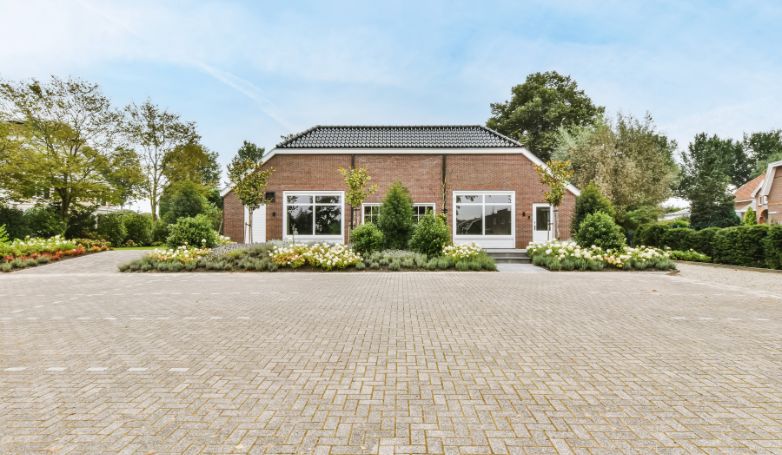
Parking lot pavers offer a high degree of customization, allowing business owners to select from a wide range of materials, colors, shapes, and patterns. This versatility enables you to tailor the parking lot to match your business’s aesthetic and functional needs precisely. Whether seeking a traditional, elegant look or a more modern, distinctive design, pavers provide the flexibility to achieve your desired outcome.
Durability of Different Materials
Pavers are generally known for their durability, with a lifespan that can rival that of concrete and asphalt when properly installed and maintained. However, the durability can vary significantly based on the type of material chosen. Options like brick, concrete, and natural stone each have different strengths and lifespans, with some being more suitable for high-traffic areas than others.
Cost Considerations
While offering numerous benefits, paver parking lots are typically more expensive than other surface options like asphalt or gravel. The higher cost is attributed to the materials used and the labor-intensive installation process, which often involves meticulous placement and alignment. This investment, however, can significantly enhance the property’s value and curb appeal.
Minimal Maintenance Requirements
One of the appealing aspects of paver parking lots is their low maintenance requirements. Unlike asphalt that needs periodic sealing or gravel that requires regular leveling, pavers need minimal upkeep. Routine maintenance mainly involves keeping the surface clean and occasionally replacing individual pavers if they become damaged or stained.
Immediate Usability Post-Installation
Pavers have the advantage of being immediately usable after installation. Unlike concrete, which requires time to cure, paver parking lots can be opened for use as soon as the installation process is completed, minimizing downtime for your business.
Need for Thorough Research
Choosing the right pavers requires careful consideration and research. Factors such as climate, the expected traffic load, maintenance capabilities, and aesthetic preferences play a crucial role in determining the most suitable type of paver for your parking lot. This research is vital to ensure that you invest in a parking solution that not only looks good but also meets your long-term functional requirements.
Paver Parking Lot Pros And Cons
When considering parking lot surface options, paver parking lots stand out for their customization options and durability. However, they come with specific considerations regarding cost and the need for thorough research before installation. Here’s a detailed breakdown of the pros and cons of paver parking lots to help you determine if they align with your business requirements and aesthetic preferences:
| Pros | Cons |
|---|---|
| Different Types of Pavers to Choose From: Highly customizable with various types. | Cost: around $2.50 to $4.50 per square foot. |
| Durability: Very durable. | In-Depth Research is Necessary: Proper selection and installation require thorough research. |
| Maintenance: Require minimal maintenance. | |
| Immediately Usable: Can be used right after construction. |
FAQs about Parking Lot Surface Options
When selecting a parking lot surface, several common questions arise regarding the best material choices, their cost-effectiveness, and overall suitability for specific needs. Here are some frequently asked questions to provide clarity on parking lot surface options:
What is the best surface for car parking?
The best surface for car parking depends on various factors including budget, climate, traffic volume, and maintenance capabilities. Asphalt is widely regarded as a versatile and durable option, suitable for a range of climates and traffic conditions. It’s cost-effective and relatively easy to maintain, making it a popular choice for many commercial parking lots.
Which material is optimal for constructing a parking lot?
The best material for a parking lot can vary based on specific needs. For durability and longevity, concrete is a top contender, though it comes at a higher cost. For a balance of cost and durability, asphalt is often preferred, while for eco-friendly alternatives, permeable pavers are ideal due to their ability to facilitate water drainage and reduce runoff. The choice ultimately hinges on budget, maintenance considerations, and aesthetic preferences.
What is the cheapest material for parking lots?
Gravel is generally the cheapest material for parking lots. It’s cost-effective in terms of initial installation and is quick to lay down. However, it requires more maintenance compared to other surfaces and may not offer the same level of durability or professional appearance as asphalt or concrete. It’s a practical choice for areas with low traffic volume or where temporary parking solutions are needed.
Conclusion
Selecting the appropriate parking lot surface is a crucial decision that involves evaluating factors such as cost, durability, and aesthetics. Will you opt for the robust and long-lasting concrete, the budget-friendly yet simple gravel, or the popular and dependable asphalt? Each option has its unique strengths and considerations. We recommend a thorough comparison of these choices to determine the best fit for your specific requirements, ensuring your parking lot meets both your functional and aesthetic needs effectively.

